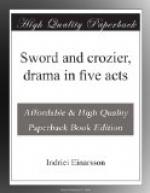Both in poetic value and technically—excepting for the staginess of the three meetings in the cave—the second act is the most successful of the drama. It is, in fact, a little masterpiece. The action is impetuous, strong, and telling. The dramatic germs potentially present in the situation are developed here with a fine consistency. Thorolf’s death is made the central fact on which hinges the whole action of the play, while by Brand’s fatal vacillations and the insults offered to Helga by his henchmen important tributary impulses are given toward the following development. Unfortunately, the third act, dramatically considered, is concerned chiefly with details. It suffers, even more than the first act, from a certain prolixity which is not wholly made good by its theatrically effective ending. However bright and skillfully wrought in the incident of the fraudulent miracle, it might well be spared, with a view for the whole. And the same is true of a considerable part of the dialogue.
There is small doubt that the fifth act offered the greatest difficulties to be overcome, because here the poet is face to face with the essentially epic nature of his subject matter and was certainly put to it to overcome this handicap. This is the state of affairs: The enraged chieftain is prevented by his implacable wife from yielding. The allies do all in their power to obtain peace. If Old Norse conceptions are adhered to there is a deadlock. Now, nothing prevents the epic art of the saga from telling, at this juncture, that forth stepped Bishop Botolf and with threat of excommunication brought about a satisfactory conclusion. It is different in the drama. In it the intervention of the bishop as deus ex machina is a quasi-external element, because not sufficiently motivated in the preceding development. It remains an incident.
For all that the title is justifiable. Conceding that this sudden ‘good’ ending looks like a concession and certainly is a constructive weakness, yet in the inwardness of the subject it is excellently motivated by the typically mediaeval attitude of Kolbein to salvation and the Church as its sole bestower. Notwithstanding the ambiguity of its victory, the Crozier has won. Another power than the moribund gods and the overstrained Teutonic conceptions of morality—the Law of the Sword—has conquered, even if by the help of conceptions almost as crude. And this well indicates the normal course of Christianity, which has at all times made its way more by weight of power and influence than by conviction and conversion.
Finally a word on the subject of the drama. Our readers are beginning to become so accustomed to the spiced dishes of Continental Problem drama,—reaction against which has set in there long ago,—that fears may well be entertained that the rude simple fare of the Historic Drama will be rejected with scorn. This would indeed be regrettable, as tending to show that we are still far from a sober catholicity of taste, and still in the leading-strings of the Old World, not yet having obtained that independence and maturity of judgment which consists in being wise enough to gather nourishment suitable to one’s needs from whatever be offered to us, even it be not labeled with the ism of the hour.




